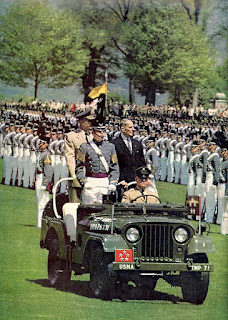 William Safire's compilation of great speeches brings together Western-centric wisdom and inspiration in the 1,157-page tome, "Lend Me Your Ears: Great Speeches in History" (W. W. Norton & Company, 2002). Here are just a few excerpts:
William Safire's compilation of great speeches brings together Western-centric wisdom and inspiration in the 1,157-page tome, "Lend Me Your Ears: Great Speeches in History" (W. W. Norton & Company, 2002). Here are just a few excerpts:Former Secretary of the Navy Theodore Roosevelt (prior to becoming President), April 10, 1899:
"The army and the navy are the sword and the shield which this nation must carry if she is to do her duty among the nations of the earth."
President John F. Kennedy at Amherst College, Oct. 27, 1963:
"I look forward to a great future for America––a future in which our country will match its military strength with our moral restraint, its wealth with our wisdom, its power with our purpose ... And I look forward to an America which commands respect throughout the world not only for its strength but for its civilization as well."
 |
| Gen. MacArthur at West Point, May 12, 1962 |
"'Duty,' 'honor,' 'country'––those three hallowed words reverently dictate what you want to be, what you can be, what you will be. They are your rallying point to build courage when courage seems to fail, to regain faith when there seems to be little cause for faith, to create hope when hope becomes forlorn."
President Franklin D. Rooselvelt at his first inauguration, March 4, 1933:
"This great nation will endure as it has endured, will revive and will prosper. So, first of all, let me assert my firm belief that the only thing we have to fear is fear itself––nameless, unreasoning, unjustified terror which paralyzes needed efforts to convert retreat into advance."
Senator Robert F. Kennedy, on the assassination of Martin Luther King, Jr., April 4, 1968:
"What we need in the United States is not division; what we need in the United States is not hatred; what we need in the United States is not violence or lawlessness but love and wisdom, and compassion toward one another, and a feeling of justice towards those who still suffer within our country, whether they be white or they be black."
 |
| Elizabeth Cady Stanton |
"With violence and disturbance in the natural world, we see a constant effort to maintain an equilibrium of forces. Nature, like a loving mother, is ever trying to keep land and sea, mountain and valley, each in its place, to hush the angry winds and waves, balance the extremes of heat and cold, of rain and drought, that peace, harmony, and beauty may reign supreme. There is a striking analogy between matter and mind, and the present disorganization of society warns us that in the dethronement of woman we have let loose the elements of violence and ruin that she only has the power to curb. If the civilization of the age calls for an extension of the suffrage, surely a government of the most virtuous educated men and women would better represent the whole and protect the interests of all than could the representation of either sex alone."
President Thomas Jefferson at his first inauguration, March 4, 1801:
"Let us then, fellow citizens, unite with one heart and one mind; let us restore to social intercourse that harmony and affection without which liberty and even life itself are but dreary things. And let us reflect that, having banished from our land that religious intolerance under which mankind so long bled and suffered, we have yet gained little, if we countenance a political intolerance, as despotic, as wicked, and as capable of as bitter and bloody persecutions."
President Abraham Lincoln at his first inauguration, March 4, 1861:
 |
| President Woodrow Wilson |
President Woodrow Wilson addressing Midshipmen at the U.S. Naval Academy, June 2, 1916:
"I congratulate you that you are going to live your lives under the most stimulating compulsion that any man can feel, the sense, not of private duty merely, but of public duty also. And then if you perform that duty, there is a reward awaiting you which is superior to any other reward in the world. That is the affectionate remembrance of your fellow men––their honor, their affection. No man could wish for more than that or find anything higher than that to strive for."
 |
| Gen. Colin Powell |
"Racism is a disease you can help cure by standing up for your rights and by your commitment to excellence and to performance. By being ready to take advantage of your rights and opportunities that will come from those rights. Never let the dying hand of racism rest on your shoulder, weighing you down. Let racism always be someone else's burden to carry. As you seek your way in the world, never fail to find a way to serve your community. Use your education and your success in life to help those still trapped in cycles of poverty and violence. Above all, never lose faith in America. Its faults are yours to fix, not to curse. America is a family. There may be differences and disputes in the family, but we must not allow the family to be broken into warring factions."
 |
| Daniel Webster |
"We may hope that the growing influence of enlightened sentiments will promote the permanent peace of the world ... Our proper business is improvement. Let our age be the age of improvement. In a day of peace let us advance the arts of peace and works of peace ... Let us cultivate a true spirit of union and harmony."
The themes here are courage over fear, unity over disharmony, human rights as universal ideal, service as sacred duty, and permanent peace as our collective ultimate goal.
No comments:
Post a Comment